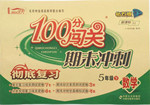题目内容
3.We thought that he was too young,so we didn't arrange for him to carry out the heavy task.Taking his youth intoconsideration/account,we didn't arrange for him to carry out the heavy task.
分析 我们当时认为他太年轻,所以没有安排他执行这项重的任务.
把他年轻考虑进去,我们没有安排他执行这项重的任务.
解答 答案是Taking;consideration/account;本题考查同义句转换;原题中的"We thought that he was too young我们认为他太年轻"可以转换成同义短语"把他的年轻考虑进去",take…into account/consideration表示"把…考虑进去";题干中需要的是状语,且take与句子主语we之间是主动关系,所以用现在分词,故答案是Taking;consideration/account.
点评 本题考查句型转换,在比较原句和改写句的基础上分析同义结构或句型,要积累常见同义词、同义短语和同义结构.

练习册系列答案
 100分闯关期末冲刺系列答案
100分闯关期末冲刺系列答案
相关题目
13.-Would you like to join us in the game?
-________,for I have something important to do.( )
-________,for I have something important to do.( )
| A. | I will | B. | I'd love to | C. | I won't | D. | I'm afraid not |
12.
Japanese and American Comic Book Heroes
To some people,the idea of reading comic books seems childish.To others,comics are nothing more than (41)J of their happy childhoods.But for people who love comic books,they can be a(n) (42)G escape from the realities of modern life.Comics are able to (43)K readers to brightly-colored,imaginary worlds where superheroes fight with super-monsters,where good can succeed over bad,and where heroes can save thousands of innocent people from the"bad guys."Comics are published globally,but Japanese and American versions (44)F the market despite the fact-or perhaps because-they differ in some ways.
One difference is the appearance of the heroes.Manga ([日语]漫画) heroes look smaller,younger,and more immature than their all-conquering American ones who have sport muscles and wear themed clothes.Also,manga heroes rarely look Japanese,and the stories are not typically set within a Japanese(45)D.Conversely,American comic heroes,despite their masks,are proudly American and are admired for their (46)C to defend U.S.cities.Importantly,in Japan a manga creator can himself or herself become a national hero,becoming almost as famous as the characters.
Probably the biggest difference is the (47)H.Up until the 1950s,American comic books were read by both children and adults,with popular titles such as Superman selling as many as half a million copies per month.The(48)A of TV,however,led to a long-term decline in sales so that now the average reader of an American comic book is a teenage boy with an interest in superheroes.In Japan,the (49)E couldn't be greater.There manga sales are still (50)B,reaching as high as 7billion each year largely because readers range from young boys and girls up to middle-aged men and women.A survey by the Mainichi newspaper estimates that 42percent of women aged 20to 49read comics.Manga for men and boys,like the American comics,tend to be action-oriented,while manga for women and girls tend to be focused on relationships.
| A.arrival B.booming C.contest D.context E.contrast F.dominate G.fantastic H.readership I.readiness J.reminders K.transport |
To some people,the idea of reading comic books seems childish.To others,comics are nothing more than (41)J of their happy childhoods.But for people who love comic books,they can be a(n) (42)G escape from the realities of modern life.Comics are able to (43)K readers to brightly-colored,imaginary worlds where superheroes fight with super-monsters,where good can succeed over bad,and where heroes can save thousands of innocent people from the"bad guys."Comics are published globally,but Japanese and American versions (44)F the market despite the fact-or perhaps because-they differ in some ways.
One difference is the appearance of the heroes.Manga ([日语]漫画) heroes look smaller,younger,and more immature than their all-conquering American ones who have sport muscles and wear themed clothes.Also,manga heroes rarely look Japanese,and the stories are not typically set within a Japanese(45)D.Conversely,American comic heroes,despite their masks,are proudly American and are admired for their (46)C to defend U.S.cities.Importantly,in Japan a manga creator can himself or herself become a national hero,becoming almost as famous as the characters.
Probably the biggest difference is the (47)H.Up until the 1950s,American comic books were read by both children and adults,with popular titles such as Superman selling as many as half a million copies per month.The(48)A of TV,however,led to a long-term decline in sales so that now the average reader of an American comic book is a teenage boy with an interest in superheroes.In Japan,the (49)E couldn't be greater.There manga sales are still (50)B,reaching as high as 7billion each year largely because readers range from young boys and girls up to middle-aged men and women.A survey by the Mainichi newspaper estimates that 42percent of women aged 20to 49read comics.Manga for men and boys,like the American comics,tend to be action-oriented,while manga for women and girls tend to be focused on relationships.